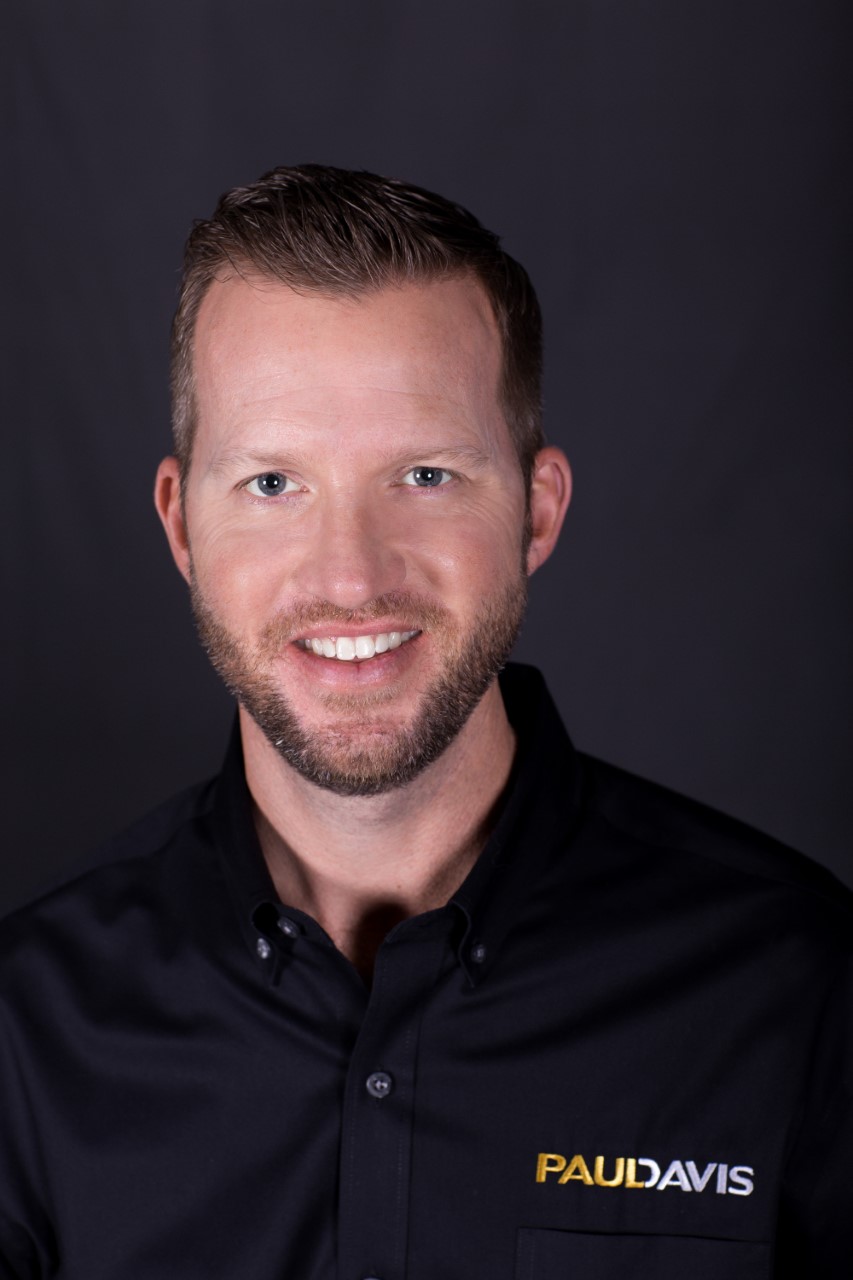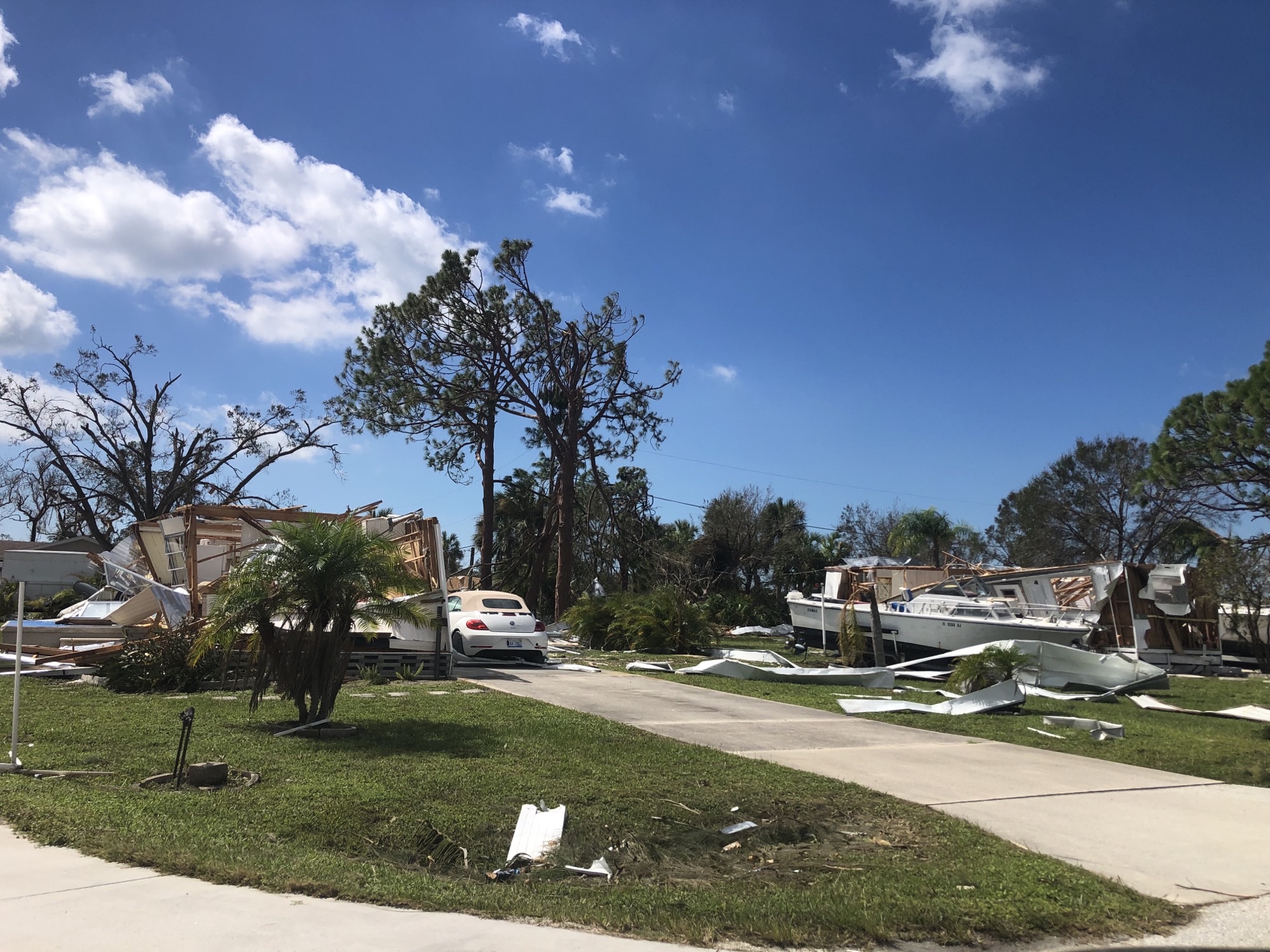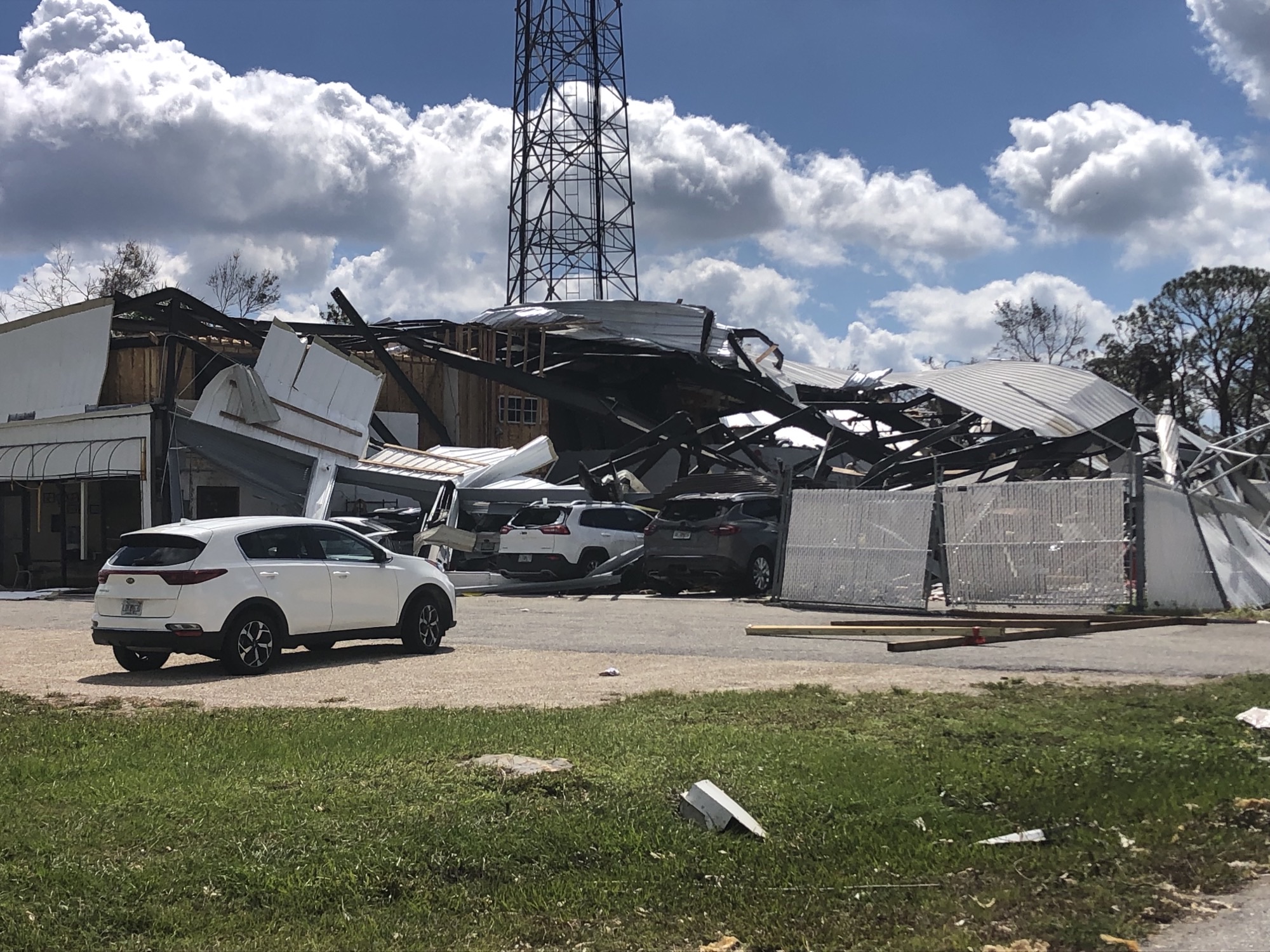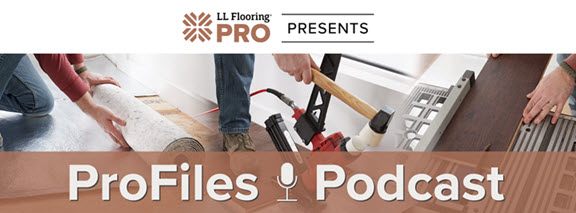- Home
- Education
- ProFiles Podcast
- ProFiles Season 2 Episode 3: Ground Zero for Hurricane Ian Restoration Efforts
ProFiles Season 2 Episode 3: Ground Zero for Hurricane Ian Restoration Efforts
Banker Turned Remodeling Pro Restores Properties After Disaster
ProFiles Podcast host Tom Krauetler's inspiring discussion with Darren Impson, who owns the Paul Davis Restoration franchise in Clearwater, FL. Paul Davis is a national restoration company for whom LL Flooring is a national flooring partner.
Darren’s franchise is at ground zero for Hurricane Ian recovery efforts.
Or
CHOOSE FROM ANY PODCAST PLAYER
Or
Use the player below:
Season 2 Episode 3 Summary
Darren Impson is a second-generation disaster recovery contractor with Paul Davis, a full service residential and commercial emergency cleanup and restoration company for disasters of all sizes. A former banker, Darren built his skills and his business restoring properties in the Tampa area by restoring homes and buildings damaged by floods, fire, lightning and more.



Season 2 Episode 3:
|
00:00 |
TOM: Hello, and welcome to the Profiles Podcast or presentation of LL Flooring. I'm Tom Kraeutler, and we're glad you're here. Whether you're a builder, remodeler an architect or designer, or a developer, or really in any way related to residential or commercial construction, this is a podcast for pros just like you. On this show, we feature extraordinary entrepreneurs who are making a difference in the lives of their customers and their employees and their communities. And we dig into the secret sauce that makes them good at what they do and share those tips and hope that you'll find value in these words for your own business. |
|
00:35 |
Now let's get to work. |
|
00:37 |
If your home or business were hit by a disaster like a storm, a flood, or a fire, finding the right remodeling pro to repair damage quickly and efficiently is key to getting life back to normal. Well, my guest today does just that. |
|
00:53 |
Darren Impson is a second-generation disaster recovery contractor with Paul Davis, a full service residential and commercial emergency cleanup and restoration company for disasters of all sizes. Darren. Welcome to the Profiles Podcast. |
|
01:09 |
DARREN: Thank you, Tom. I'm happy to be here. |
|
01:12 |
TOM: Well, super glad to have you as well, sir. So, disaster restoration, that is a very specialized area of the remodeling industry, isn't it? |
|
01:22 |
DARREN: It certainly is very different from remodeling. Even though we do remodeling on just about every job that we do, we are very specialized in dealing with disasters to property, both commercial and residential. |
|
01:38 |
TOM: I mentioned you were second generation disaster recovery specialist. Is this a business that was passed on to your family? |
|
01:45 |
DARREN: Yes. So, Paul Davis is a national franchise network, and my dad bought a franchise here in Tampa back in 2000. He kind of stumbled on this Paul Davis restoration franchise. He said, hey, this is a really niche business specializing in insurance type restoration, dealing with disasters, fires, water losses, mold, storms. And it’s fairly recession proof being that these types of disasters happen all the time and somebody's got to take care of them. What a great business to be helping people in their time of need. And I lived in New York City at the time with my wife and work downtown, and we were there, unfortunately, for 911, and we were kind of looking for a reason to get out of New York. And this was a great opportunity to move to Florida and go into business with my father. |
|
02:33 |
TOM: So, it seems like your Dad and you both sort of came into this business as a second career. I think it's great that he was looking for a little part time business to earn a little extra income while he sailed on towards retirement. And now you've got three franchises with 60 employees. So, I guess that worked out pretty well. |
|
02:51 |
DARREN: Yes, in hindsight, yes. It was a great career move and great life move for my wife and I. Collectively, we're one of the largest Paul Davis's in the network. And like you said, I have 60 employees and our annual revenue is close to 20 million a year. So we're very proud of our business here and we're happy to be helpful people in a market that has lots of insurance type disasters with hurricanes and tropical storms and just everyday lightning here in the lightning capital of the world. |
|
03:22 |
TOM: Was it difficult for you moving from a banking career in New York City to a restoration business? Did you have a skill set in that space or were you focused mostly on the management? How do you sort of bridge that gap? |
|
03:36 |
DARREN: Well, I didn't know much about construction or restoration. One of the great benefits of the franchise system is the training that's offered. So when I joined the team, my dad's team in 2003, I came in as an estimator and learned. I was just constantly learning every day. It was a learning experience with the different types of disasters that I was encountering on a daily basis. Just the everyday water loss to a whole house fire and learning a whole new industry, but also how to estimate and how to project, manage a job and most of all, how to take care of people in the time of need and offer good customer service. We're in the service industry and that's really what it comes down to is good customer service and communicating and obviously delivering a quality product at the end gets us more business. But we are in the service industry. |
|
04:26 |
TOM: So Darren, you're in a very specialized business in the sense that while you're doing many of the same tasks that say, a remodeler or carpenter, contractor or builder might do, you're working with clients who are victims of a disaster. So, it's a very stressed, very emotionally charged environment. I mean, they, as your client want their homes or businesses back just the way it was before the disaster, as quickly as possible. Tomorrow is not soon enough. So how do you manage that environment, that kind of pressure and that kind of stress on the part of your clients relationship with their property that's been damaged? |
|
05:09 |
DARREN: Well. It's very different from remodeling in the fact that if you're going to remodel your kitchen or bathrooms or whatever it is, you're planning on not having a kitchen for a period of time. You're planning on not having use of your bathrooms or if you're doing floor throughout the house. Obviously, there's some expectations that you're going to be displaced and an insurance restoration claim it is the opposite. We are dealing with something that was not planned and typically an everyday water loss, washing machine, line bursts and floods part or all the house, you're dealing with total disruption and obviously something the property owner didn't plan on and it's very hectic. And then add in dealing with the insurance carrier, which can be frustrating at times, a slow process and most people just don't know what to do from the get-go. So, we are different in the fact that we are used to dealing with people that are in the worst situation they've been in. Especially if you think of like a house fire, devastating. Not only is the direct damage from a fire, but you've got damage throughout with soot on everything in the home, all your clothing, all your contents. And we deal with that as well, as well as the construction part. We do everything from the initial emergency work, the dry out, board up, clean up, remediation, to handling our customers contents, dealing with the contents, whether we got to pack it out and move it to our storage facility. We can at least pack out areas that we're going to be working on in the home and get their precious contents secured so that we can then do demolition and of course the reconstruction of the property. |
|
06:48 |
TOM: I'm talking to Darren Impson. He's the president of Paul Davis, a disaster restoration company based out of Tampa, Florida. Darren has three Paul Davis franchises and works to try to help victims of disasters essentially get back on their feet in terms of the condition of their residence, the condition of their business, the condition of all their property that could be impacted by a fire, a flood or other disaster. Darren, tell me how the process works. If one were a victim of a disaster, do they contact you directly? Do they go through an insurance company? What's the way to kind of move forward after that incident has happened? |
|
07:29 |
DARREN: Well, Tom, our customers are the property owners, whether that's a residential home or business, but our clients are the insurance carriers or property managers. And typically, if you had an insurance type loss at your property, the house floods or you had a kitchen fire, most people would try to locate their insurance documents and call their insurance company or call the insurance agent, what do I do with file a claim eventually? And most insurance companies, like I said, those are our clients. And if they have a vendor program, typically we're on it and they would dispatch us to the property and handle the initial emergency work and hopefully the whole process of putting the property back together. |
|
08:19 |
TOM: So, the emergency work would be to cover an open roof or to somehow prevent any further damage from occurring due to the maybe ongoing weather, for example. Is that correct? |
|
08:31 |
DAREN: Yup, absolutely. Or dry out. It's so important. If you have a flood in the house, get it dry quickly. We set up fans and dehumidifiers, do some demolition. If it's a material that cannot be dried, but very important to get it drying going immediately or as quickly as possible because it's not dry quickly, then mold will start to grow after 72 hours or so. That obviously creates a much bigger issue. |
|
08:59 |
TOM: Mold is a huge issue today in America. It's become more well-known because of the devastating effect it can have on a property and the potential serious health effects it can have on the property's occupants. So that must be top of mind in all of your water related restoration work. What's the key to try to minimize the development of mold after a disaster? |
|
09:24 |
DARREN: The key to avoiding a big mold problem is getting drying started quickly. Typical drying process takes at least three days, depending on the severity. But it's very crucial to get the property and the materials dried as quickly as possible, because if not, then mold can start to grow. |
|
09:40 |
TOM: So, what's that process like? Are you using fans? Are you using heat? Obviously if the roof was torn off and you're closing that off, so it doesn't get any worse in there, but are you also treating it with mildewcides? What's the process of mold remediation, or I should say, stopping a small mold problem becoming a very big one? |
|
10:00 |
DARREN: The process for dealing with a dry out typically is to assess the severity, how many rooms are affected, and start to move around content so that we can create a drying chamber and set up fans as well as dehumidifiers. Fans circulate the air, and the moisture wicks out of the building materials and the dehumidifiers actually capture the moisture, effectively dry out the property. Also utilizing heat, there's a whole science to it of making sure that proper humidity levels are maintained in the home in order to extract that water from the building materials. |
|
10:33 |
TOM: All comes down to managing the moisture, doesn't it? |
|
10:36 |
DARREN: Absolutely. When we encounter mold, if there's already mold present when we're called in, important thing to do there is contain that area. Typically we would bring in an industrial Hygienist, a third party, to assess the mold situation, to see how far it goes, if it got into the air, if it's in the HVAC system, and then we would follow their lead. They would typically write a protocol as far as what is needed to properly remediate that mold. |
|
11:03 |
TOM: I want to talk with you about dealing with insurance companies. It can be a blessing and a curse sometimes after disaster. I remember after Hurricane Sandy, it has to be about ten years ago now. I did a series of stories about victims of Hurricane Sandy, and one in particular was a gentleman whose family had a property out in the area that was completely flooded, in fact, somewhat disconnected from the rest of the state. And despite the fact that they were told to evacuate, he evacuated his family. But he decided he was going to stay behind in the house. And the reason he wanted to stay there was so that he could be among the first to report his claim to the insurance company. That's how desperate sometimes people feel about trying to get service from their insurance company. So I certainly didn't think that was the best way to proceed. But do you have any tips for folks that are in a disaster and need to do things 1st, second and third. What would be the order of events? |
|
12:07 |
DARREN: Disaster strike. You can never plan a disaster. Obviously, if it's a hurricane, you're watching it as it's making landfall. But I think it's important, no matter what to have a plan ahead of time. Know who your insurance carrier is, review your policy yearly with your insurance agent, know your deductible. If your policy has any exclusions, I think it's important to plan ahead and your homework ahead of time before that disaster hits. |
|
12:37 |
TOM: So when you're doing a disaster restoration, Darren, speed and efficiency are obviously critical. How have the supply chain issues of these last couple of years impacted your business? Has that been a challenge for you? It certainly has. |
|
12:53 |
DARREN: I mentioned earlier that our business is somewhat recession proof because disasters always happen, and somebody's got to take care of them. But we're not inflation proof, meaning that the cost of goods and the availability of goods in an inflationary period are tough to keep up with. And obviously we want to provide exceptional service to our customers trying to get the job done as quickly as possible, give them the best products they can for the budgets that are created with their insurance claim. And it's been challenging, really challenging. We use software that creates pricing, it's called Xactimate and Xactimate updates their pricing monthly for different regions and they can't keep up. |
|
13:39 |
TOM: Wow. It must be interesting for you every time you go into an estimate that you may have done a month ago or two months ago and just see how the changes are. The prices have changed over a short period of time because of these supply chain issues. |
|
13:51 |
DARREN: Yes, it's very challenging right now. |
|
|
TOM: Do you have to commit to the prices that you're charging at some point, and after that it's your risk whether it goes up or down or does it sort of float until at some point in time when it gets locked in, maybe when the restoration begins. How does that work? |
|
14:04 |
DARREN: Essentially, we're locked in from the time we write that estimate using that price list. So if there's delays that are outside of our control, permitting, whatever it is, we obviously want to be communicating that back to the insurance company so that if there are items that drastically increase in price, we're certainly communicating that back to the insurance adjuster. And if there's an opportunity to go back with a supplement to accommodate for those pricing increases. And we are certainly trying, but a lot of times we're stuck. |
|
14:36 |
TOM: Yeah, you're kind of in a position where you have to kind of predict the market. Despite the best technology, you still have to make a gut call as to which way prices are going to go and maybe try to include a little bit of a bumper in there, so you don't get hurt. |
|
14:49 |
DARREN: Yes, it's difficult with the adjusters are looking at our estimates very carefully and making sure that we have an accurate scope written. We're stuck with the prices that are in that estimating software. So it certainly is a challenge, especially today. |
|
15:06 |
TOM: Now, if you own a business or a house and you had a fire or a flood, some other covered peril, as it's called, you have some options in terms of how you work with the insurance company. You can call them directly and have their adjusters visit your property and provide an estimate. Or you could hire a public adjuster, one that works just for you, typically on a percentage of the claim. I imagine you have experience with both routes, so to speak. Any advice for making that decision on the part of a victim? |
|
15:40 |
DARREN: Public adjusters certainly they have a very unique position to be able to help people that are not maybe being taken care of by their insurance company. Or I think more applicable situation for a public adjuster to really be helpful is not a commercial loss where the insured say they have a devastating fire to their business and they're dealing with loss of use. They're dealing with employees that obviously can't work and they need to either provide compensation or they're going to leave and go elsewhere and then they're really stuck once they get the restoration completed. Public Adjusters can certainly help with the complicated coverage when it comes to a commercial loss. But at the end of the day, on a residential loss, especially working with a company like Paul Davis that has a good relationship with your insurance company is going to get the customer same result, but at a much faster pace. |
|
16:44 |
TOM: So I guess one of the secrets to not being impacted by supply chain is to have good reliable relationships with companies that can serve as suppliers for you in good times and in bad. And I know that you work a lot with LL Flooring. Great company, great products. Boy, we want to look for some beautiful waterproof products. That's the place to go if you're worried about this happening again. But how do you work with a company like LL Flooring and how do they serve your needs so that you can react quickly to restoring the homes that you're working on? |
|
17:20 |
DARREN: So LL Flooring is a national preferred vendor of Paul Davis. As an Ll Flooring pro, we get preferred direct service and pricing. And in this current environment, having those preferred relationships is crucial. To have a go to company where we know that they're going to have products in stock and it's going to be a reasonable price is crucial. And a huge company obviously have a lot of resources for products, for flooring and tile, especially after a water loss. Somebody has a water loss on their property, they may want to look at other flooring materials. Ya know, we see trends! |
|
18:01 |
TOM: Sometimes I hear about these houses, I'm like, look, just stop with the carpet. Just stop! |
|
18:06 |
DARREN: Or the laminate flooring! Obviously, typically, laminate flooring, once it gets wet, it expands and is not reasonable. Can't really dry it out. But there are products now we're seeing trends, replacing that old flooring with new products that are water resistant and even waterproof. LL Flooring has got some great products in that line with Luxury Vinyl Tile, Luxury Vinyl Plank. They actually have a product called Hybrid Resilient Flooring, which. |
|
18:38 |
TOM: That's the Duravana product. I use that in my laundry room. Fantastic stuff. It's really durable and waterproof. |
|
18:46 |
DARREN: Absolutely replicates natural hardwood. Looks like the real thing and is more wear resistant for pets, kids, and it's waterproof. So, it's an easy sell with our customers who just experienced their whole house flooring getting ripped out because it got wet. |
|
19:02 |
TOM: One of the things I learned when reading about your business, Darren, was that you placed great importance on education. Things are always changing. Your franchise offers courses for not only your own people, but it looks like insurance professionals as well. Is that a really important part of what you guys do? Especially in light of the fact that we've had such shortages in the skilled trades. Being able to take, perhaps a young person who just was coming out of high school, for example, and putting them into a business where they can be trained and specialized and productive and making a good living for themselves and their families and your business in a fairly short period of time, that must make a big difference in how your business can survive and thrive. |
|
19:50 |
DARREN: One of our values at Paul Davis is to practice continuous improvement. And obviously that is something that we're doing every day as a company to always be better, always be more efficient, better quality, better communication, better customer service. But we also offer training to our clients. In my facility in Tampa, we have a classroom that we invite insurance adjusters too. It's important that adjusters are properly trained on how to properly dry a property, a home, so that when they're looking at invoices from Mitigation companies, they know what they're looking at and they know how many pieces of equipment are needed for a twelve-by-twelve room. |
|
20:32 |
TOM: It's not just the price, they have to be doing it correctly. And if they see a quote from a company that is not providing enough fans or enough the humidifiers, or not taking the time to take apart those parts of the building that are necessary to expose the insulation in the walls, for example, they need to be able to recognize that those elements are missing. And it should be a big red flag, but you need training to do that. |
|
20:53 |
DARREN: We actually built two, we call them dry houses here on my property that are essentially small trailers that we've built, kind of a mock home. In each one of them, one has a living room and a kitchen, and the other one's got a bedroom and a bathroom. And part of that class, the learning process, is we flood them, we soak them down. |
|
21:16 |
TOM: Oh, that's cool. |
|
21:17 |
DARREN: And then we make them dry it and we show them how it's done. And then they go up in the classroom and they learn the science of drying. So we try to educate not only our employees, but also our clients on how to do things right. And like I said earlier, practice continuous improvement is one of Paul Davis values that we are striving for every day. |
|
21:40 |
TOM: So, Darren, being in the disaster restoration business, I'm sure every project is somewhat memorable, but there have to be some standout projects, some projects that are unusual or those that you're particularly proud of. And I want to ask you about some that I've come across, and one is the Major League Baseball star Carlos Santana. He plays with Seattle Mariners. It was during the season when lightning struck his home in Tampa and caused quite a bit of damage. That must have been an unusual call for you to get. |
|
22:12 |
DARREN: Yes, we do all types of projects small, medium, large. And this happened to be a big house fire here in Tampa. |
|
22:21 |
TOM: Well, disasters don't discriminate, so it doesn't matter if you're a baseball star or not. Lightning is going to hit where lightning is going to hit. What kind of damage did it do to his home? |
|
22:31 |
DARREN: Lightning struck the roof in the middle of the night during a really bad storm and ignited a fire in the attic, ignited the trusses in the attic, and more than half of the trusses were burnt beyond repair. So when you show up on a site like that, first of all, obviously the fire is put out by the fire department, but then you're looking at a building that's open to the weather, so that's got to be closed in. You've got the fire damage to worry about. Correcting. You've got smoke damage and you've got lots and lots of water damage. So, it's kind of like a trifecta there of disasters you have to act on quickly in order to make sure it doesn't get any worse. |
|
23:06 |
DARREN: Absolutely, yeah. And you think about all the contents for Major League Baseball Star, awards and memorabilia that they've collected over the years. A lot of priceless items that need to be attended to immediately. We get in there and pack out those items, get them out of that environment and back to our warehouse and cleaning facility, get them cleaned and put in storage for when we get everything put back together and move them back in, which will be probably close to a year at least, to get back to that stage. But at least we're handling their precious items as quickly as possible and securing the property as quickly as possible to avoid further damages. |
|
23:45 |
TOM: So, you've been in this business for a long time. Was what? 2003, when you started? Throughout all of those years, now almost 20 years, you must have faced some business challenges that you've had to overcome. What advice would you give to anyone listening who's faced with similar situations? |
|
24:02 |
DARREN: Yes, I'm coming up on 20 years with Paul Davis restoration and certainly faced lots of challenges early on in my career in 2004, we had multiple hurricanes that hit the Tampa Bay area, hit Florida, but specifically Tampa Bay, and we had a major influx of business, and we grew rapidly, which sounds great, but can be very challenging. Obviously, we want to make sure we give the same service to every customer and white glove treatment. And as you grow, obviously you need to add employees and resources to be able to handle the influx of business. And certainly, growth is challenging, especially this day and age. Trying to find A Players is very difficult to add to our team. And that's all we do. We only hire A Players. And I think the biggest challenge for any business is making sure you hire the right people. |
|
24:56 |
TOM: So grow, but grow slowly, grow deliberately and grow by hiring the most qualified people that you can find. |
|
25:02 |
DARREN: Absolutely. |
|
25:04 |
TOM: Paul Davis is a disaster restoration company, but that's not all you do. You actually have a very successful remodeling business as part of your franchise, is that correct? |
|
25:15 |
DARREN: Yes, we also do remodeling. We do remodeling on pretty much every insurance restoration job. Now is the time to upgrade. Once you've been displaced, you can start thinking about the positives. |
|
25:28 |
TOM: That's interesting. Yeah. I always say the four most expensive words in home improvement are "while you're at it." But you're right, if you're out of the house and you're doing all this major work, it is the time to think about making the changes that you might have been sort of kicking around for years. But now is the opportunity. |
|
25:43 |
DARREN: Yes, absolutely. Pretty much every restoration job we're on, we're offering options for upgrades. We have a beautiful showroom in our facility here in Tampa, and I know most insurance claims are devastating, but trying to get our customers focusing on the positives and when they come into our showroom, and they see all these great products and we're able to kind of get them focused on the positive. And we're going to rebuild your home, remodel your home to better than pre lost condition. |
|
26:12 |
TOM: Do you ever have folks that just hire you straight out for modeling that have not had disasters? |
|
26:17 |
DARREN: We do, yeah, we do a decent amount of remodeling, mostly word of mouth or for previous customers or friends and family of previous customers. Quite a bit of remodeling, both residential and commercial. We're working on a few really big projects right now. We work with a few designers that bring us their clients because they know we're going to take really good care of them and offer quality product and the service that they're selling as a designer. |
|
26:45 |
TOM: So, I imagine a lot of your work comes from word of mouth. But talk to me about how you advertise and promote your business outside of that or specific tactics that you're using. Have you found are successful? |
|
26:58 |
DARREN: Our client is typically the insurance carrier or property manager, and they know us. Well, the general public might not know who Paul Davis is. Yes. |
|
27:10 |
TOM: And if you're the general public, it's probably a good thing because you haven't needed those services. |
|
|
DARREN: Exactly. My franchise, we do a lot of branding here in the Tampa Bay area. We're partners with the Tampa Bay Lightning, partners with the Tampa Bay Buccaneers, and we do some TV advertising, radio advertising. I've got a billboard behind my building. And so we probably advertise more than some of the other Paul Davis's, but we are focused on branding. Right. |
|
27:40 |
TOM: Keeping that profile, you want to be top of mind when the disaster strikes. You want to be the first number or one of the first numbers that folks reach out to. So it's important that they feel comfortable and that you feel familiar as part of the community. |
|
27:54 |
I'm talking with Darren Impson. Darren is the president of Paul Davis Damage Restoration. He has three franchises in the Tampa Bay area. So, Darren, one final question I always ask my guests, and that is when you started this business, when you made the change, when you left banking and you got into this, what's something you wish you knew? |
|
28:17 |
DARREN: I wish I would have tried to expand earlier on and buy more franchises buy more territory because it is such a great business helping people in their time of need. And I wish I would have expanded earlier, but I've got three franchises now, and who knows how many more I'll add. Well, you're doing 20 million a year in business right now, so I think you owe yourself a pat on the back for that, my friend. |
|
|
TOM: Darren Impson with Paul Davis. Thank you so much, Darren, for stopping by the Profiles Podcast, sharing with us your business, your experience, your tips, and your advice. |
|
28:50 |
DARREN: Thank you, Tom. I appreciate it. Thanks for having me. |
|
28:59 |
TOM: Hey, guys. Shortly after I recorded this interview with Darren, he and his company were thrust head on into one of the largest disaster recovery operations the nation has ever seen. On September 28, Hurricane Ian made landfall in Florida as a category four storm with 150 miles per hour winds, which made it one of the strongest storms ever to hit the US. Mainland. I thought a lot about Darren's company and the thousands of victims needing recovery assistance and wanted to check back in to see what that initial experience was like and how the recovery is progressing. |
|
29:33 |
TOM: So, Darren, your business is disaster recovery. You've. Trained for that, you've staffed for that. But Ian was bigger and more damaging than anyone had really expected. So first, I hope that you and your family and your employees were safe through the hurricane, but could you tell us what it was like to live through that and how it's impacted your business now? |
|
29:52 |
DARREN: Well, thanks, Tom. Obviously, we're in the disaster recovery business. Hurricanes are very devastating, and the original path was for Ian to hit the Tampa Bay area, but hit further south. |
|
30:05 |
TOM: So what happened? After the storm hit? |
|
30:07 |
DARREN: Well, we wanted to make sure everything was okay with our employees and their own homes here in the Tampa Bay area. Once the storm passed, we were ready to go and we were ready to help people. We ended up, over the period of the next two months, we mitigated and did demolition and over 100 flood claims, both residential and commercial. |
|
30:26 |
TOM: Did you have what you needed to do that in terms of materials? Was supply chain an issue for this? |
|
30:31 |
DARREN: Fortunately, we were able to stock up before the storm here in Tampa and we took our materials with us down south, so we had them before the storm. |
|
30:42 |
TOM: Well, see, now that's the advantage of working with a national company like Paul Davis, because you guys know what to expect. You know what the issues are going to be. You're certainly not going to be one of the people in line at a home center or building supply store waiting for plywood and 2X4 and plastic tarps. You guys have this stuff already so you can start to mitigate those properties, make sure they don't get any further damage, and then set about the long process of actually doing the rebuilds. What was it like with the insurance companies? Were they pretty responsive in terms of getting people mitigated, getting the claims processed? Had there been a lot of hold ups because of that? A lot of complaints? I mean, we're not from that area, so we're not seeing the local news at that level. But how has it been? It's always a challenge after hurricanes. I know when we had Sandy up here, there was a lot of delays with the insurance issues, but what was it like for the folks that were right down there in Fort Myers? |
|
31:37 |
DARREN: The claims that we handled were flood claims. So fortunately for the customers that we were working with, they all had flood insurance, which takes a while, like you said. And we went into this from experience that we were not going to deal with FEMA and wait for the flood insurance to pay these claims. So we developed a price upfront and explained to the customer what it entailed and gave them all the information, pictures and moisture readings and basically gave them a package to submit to their flood insurance once we were completed. |
|
32:12 |
TOM: So you're part of a national network of offices. Did you guys sort of come together to address things like that. I know. Like, for example, we see utility workers come from surrounding states to help rebuild an area that's impacted by a storm. Do you get support from other offices when one area is hit particularly hard? |
|
32:30 |
DARREN: Yes. One of the benefits of being a franchise network is the power of all of the offices coming together in a hurricane. And there were over 39 offices that responded from all over the country to mobilize and handle these hurricane claims. And t o my knowledge, they handled over 3,000 individual claims collectively. |
|
32:54 |
TOM: Yeah, because you were able to anticipate those underwriting standards and the questions that the insurance company would be asking and to give them all of that data ahead of time, it makes it almost irrefutable on the part of the insurance company. As long as their policy is valid, they should be paying those claims. Darren, thanks so much for spending a few minutes with us. I'm glad that you guys are all safe and sound down there. And I'm sure that your customers appreciate the fact that you were they're and ready and in place to help get them mitigated as soon as that storm was over. |
|
33:24 |
So, well done, sir. |
About the ProFiles Podcast
Listen, learn and grow your building, remodeling or contractor business with the ProFiles Podcast, presented by LL Flooring Pro. Host Tom Kraeutler profiles veteran contractors willing to share tips, tricks and ideas that are specific and actionable -- and that will result in helping make you more successful in your business.
Before launching The Money Pit, the nation’s largest home improvement radio show and podcast, Tom Kraeutler spent decades working as a tradesman, builder and professional home inspector. He’s a trusted voice to millions of homeowners and legions of contractors who appreciate his authority and expertise in construction, remodeling, design and related building trades.

Don't Miss Out, Catch Up With All Episodes of ProFiles Season 1!
Also, do you enjoy learning & watching entertaining videos on YouTube?
Please subscribe to the LL Flooring YouTube Channel and join the community. It is our goal to share informative videos that will engage, inspire, and improve.





